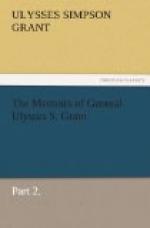While a citizen of Missouri, my first opportunity for casting a vote at a Presidential election occurred. I had been in the army from before attaining my majority and had thought but little about politics, although I was a Whig by education and a great admirer of Mr. Clay. But the Whig party had ceased to exist before I had an opportunity of exercising the privilege of casting a ballot; the Know-Nothing party had taken its place, but was on the wane; and the Republican party was in a chaotic state and had not yet received a name. It had no existence in the Slave States except at points on the borders next to Free States. In St. Louis City and County, what afterwards became the Republican party was known as the Free-Soil Democracy, led by the Honorable Frank P. Blair. Most of my neighbors had known me as an officer of the army with Whig proclivities. They had been on the same side, and, on the death of their party, many had become Know-Nothings, or members of the American party. There was a lodge near my new home, and I was invited to join it. I accepted the invitation; was initiated; attended a meeting just one week later, and never went to another afterwards.
I have no apologies to make for having been one week a member of the American party; for I still think native-born citizens of the United States should have as much protection, as many privileges in their native country, as those who voluntarily select it for a home. But all secret, oath-bound political parties are dangerous to any nation, no matter how pure or how patriotic the motives and principles which first bring them together. No political party can or ought to exist when one of its corner-stones is opposition to freedom of thought and to the right to worship God “according to the dictate of one’s own conscience,” or according to the creed of any religious denomination whatever. Nevertheless, if a sect sets up its laws as binding above the State laws, wherever the two come in conflict this claim must be resisted and suppressed at whatever cost.
Up to the Mexican war there were a few out and out abolitionists, men who carried their hostility to slavery into all elections, from those for a justice of the peace up to the Presidency of the United States. They were noisy but not numerous. But the great majority of people at the North, where slavery did not exist, were opposed to the institution, and looked upon its existence in any part of the country as unfortunate. They did not hold the States where slavery existed responsible for it; and believed that protection should be given to the right of property in slaves until some satisfactory way could be reached to be rid of the institution. Opposition to slavery was not a creed of either political party. In some sections more anti-slavery men belonged to the Democratic party, and in others to the Whigs. But with the inauguration of the Mexican war, in fact with the annexation of Texas, “the inevitable conflict” commenced.




